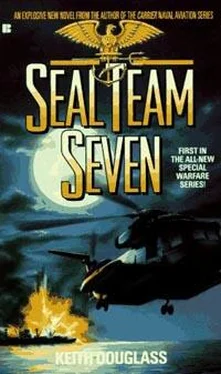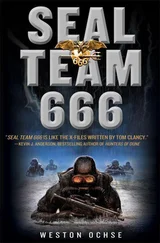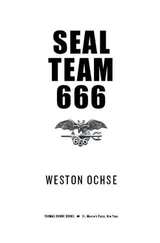Keith Douglass - Seal Team Seven
Здесь есть возможность читать онлайн «Keith Douglass - Seal Team Seven» весь текст электронной книги совершенно бесплатно (целиком полную версию без сокращений). В некоторых случаях можно слушать аудио, скачать через торрент в формате fb2 и присутствует краткое содержание. Жанр: Боевик, на английском языке. Описание произведения, (предисловие) а так же отзывы посетителей доступны на портале библиотеки ЛибКат.
- Название:Seal Team Seven
- Автор:
- Жанр:
- Год:неизвестен
- ISBN:нет данных
- Рейтинг книги:3 / 5. Голосов: 1
-
Избранное:Добавить в избранное
- Отзывы:
-
Ваша оценка:
- 60
- 1
- 2
- 3
- 4
- 5
Seal Team Seven: краткое содержание, описание и аннотация
Предлагаем к чтению аннотацию, описание, краткое содержание или предисловие (зависит от того, что написал сам автор книги «Seal Team Seven»). Если вы не нашли необходимую информацию о книге — напишите в комментариях, мы постараемся отыскать её.
Their cargo includes two tons of weapons-grade plutonium. And now, with enough nuke fuel to arm a superpower, an alliance of fanatics threatens to poison a continent.
In a daring mission of high-seas heroism, Lt. Blake Murdock leads his seven-man unit from Team Seven's Red Squad into bulkhead-to-bulkhead battle — with high-tech
buccaneers who've got nothing left to lose...
Seal Team Seven — читать онлайн бесплатно полную книгу (весь текст) целиком
Ниже представлен текст книги, разбитый по страницам. Система сохранения места последней прочитанной страницы, позволяет с удобством читать онлайн бесплатно книгу «Seal Team Seven», без необходимости каждый раз заново искать на чём Вы остановились. Поставьте закладку, и сможете в любой момент перейти на страницу, на которой закончили чтение.
Интервал:
Закладка:
Raising his own binoculars to his eyes, he carefully swept the horizon from west to east.
They were well into the northern portion of the Strait of Hormuz now. That wrinkled-looking mass of bold gray mountain rising to the north was Iran. Almost due west was the rocky, mountainous island of Qeshm, largest island in the Gulf, with its odd, cone-shaped rain reservoirs and impoverished-looking, ramshackle coastal villages. Through his binoculars, Murdock could pick out the anachronistic intrusion of radar dishes and blockhouses marking an Iranian Silkworm missile battery mounted on the erosion-streaked side of a barren hill. Camouflage tarps had been stretched between poles, shielding SAM sites and vehicle parks from the blazing sun... and from the probing eyes of American satellites.
Dead ahead, some fifteen miles across the sun-dazzled water, the port of Bandar Abbas — known simply as Bandar to the locals — rose between sea and mountains in blocks and tiers of white stone. A beneficiary of the wars, both trade and military, of the 1980s, Bandar was a large and modern city with a population of just over 200,000. Though the typically squalid tent cities and slums of most Middle Eastern cities cluttered Bandar's fringes, Murdock could make out the gleaming facades of several modern buildings above the noisome tenement hovels of the low-rent districts. Every building seemed in need of paint, however, and the dhows, fishing boats, and motor craft lining the waterfront were uniformly battered, sun-baked, and coated with ancient layers of filth and grime.
Farther west, Bandar Abbas's airport buildings were visible as gray and white blurs shimmering in the desert heat. Murdock could just barely pick out the shapes of several military aircraft there — F-4 Phantoms and F-5E Tiger IIs, for the most part, sold to Iran before the revolution — as well as the larger bulk of an Iran Air 727.
Returning his attention to the city's waterfront, Murdock examined several port facilities. One fronting the downtown area was clearly a commercial port and ferry dock; others were marinas occupied by high-sterned, lateen-rigged dhows and fishing smacks. Most of the military facilities appeared to be northwest of the city, tucked in behind the lee of Qeshm Island and the hook of the headland on which the city was built.
And that, clearly, was where Damavand was taking the Japanese freighter. Through the binoculars, Murdock identified a small shipyard between Bandar Abbas and the port of Dogerdan to the west, with dry-dock facilities, the looming skeletons of hammerhead cranes, the squat cylinders of POL storage tanks, and the long, low tent-roofed shapes of warehouses and machine shops. Numerous yard and service craft lay alongside sun-bleached wharfs; larger ships, a destroyer and a pair of frigates, were tied up alongside a fueling pier. Patrol boats and landing craft were everywhere, almost too numerous to count.
Shifting the aim of his binoculars again, he studied the stern of the Yuduki Maru. A large number of Iranian soldiers were visible on her upper deck, and the sounds of gunfire, single shots and full-auto, carried faintly across the open water. Many of the soldiers were firing off whole magazines into the sky, celebrating their victory over the Great Satan and his minions. It was unlikely that they'd been told anything about the politics of their mission, other than that it would be a blow against the hated Americans.
"Better get your celebrating done now, you sons of bitches," Murdock said softly. "You might not have the chance later."
"Hey, Skipper," Roselli called from his perch atop the deckhouse. "What do the rules of war say about you wearing a Pasdaran colonel's uniform?"
"Oh, not a whole lot, Chief. The usual hearts-and-violins stuff about piracy, hanging from the neck until dead, drawing and quartering."
"Yar!" Roselli growled. "We be pirates!"
"Aye," Higgins added, clambering up out of the companionway. "Break out the skull and crossbones!"
"You guys're pirates, all right," Murdock replied, continuing to study the Yuduki Maru through his binoculars. It looked like a deck crew forward was casting off the tow from Damavand, though from this angle it was a little hard to be sure. No doubt they'd decided that it made better propaganda for the freighter to be taken into her berth under her own steam, even if she did have to limp along on one screw.
Higgins joined him on the well deck. "Skipper?"
"Yeah, Prof. What's up?"
"I'm not sure," the slightly built SEAL replied, "but I think it involves us." Higgins had been manning the yacht's communications shack almost continuously since they'd taken Beluga, not only transmitting intelligence, but also eavesdropping on the Iranians. The radio-silence orders had applied to all of the ships in the squadron, but there'd been plenty of traffic coming out of Bandar Abbas, and from other warships in the area.
"Okay, you know I don't have much Farsi," Higgins said. "Just Arabic. But I could follow enough to know that they've been trying to raise us for the past five minutes or so. If I had to take a guess, I'd say they started out by telling us where to go, then started telling us to heave to."
"Okay, Prof, thanks. It's nothing we weren't expecting."
"Stick with the radio silence then?"
"Absolutely. Damned thing's bust, right?"
"Can't hear a thing, Skipper."
"Good. Hang tight a sec." Pulling a notebook from his pocket, Murdock began writing quickly, filling three pages with his observations of the port approaches, the military aircraft on the runway, the ships and patrol boats in the harbor, the Silkworm and SAM batteries on Qeshm. Tearing off the pages at last, he handed them to Higgins. "You read all that?"
"Sure. No sweat."
"Transmit that ASAP, coded burst through MILSTAR. Repeat it until you get an acknowledgment."
"Aye, aye, Skipper."
"And keep your primary ready. This'll get hot damned quick."
"Yes, Sir." Higgins took the papers and descended back into the cool darkness of Beluga's below-deck spaces.
Murdock glanced up at Roselli. "You hear all that, Razor? We may have company soon."
Roselli patted the captured G-3 rifle. "Ready to rock and roll, Skipper."
Raising his binoculars again, Murdock swept the harbor. Motion on the water to one side of the freighter caught his attention. "Uh-oh," he said, focusing on the blurry white mustache of a high-speed wake. It looked like a speedboat was coming toward them bow-on, racing out from the naval facility. "Okay, you pirates. Just make sure your powder's dry and your cutlasses are within reach. That company's about to pay us a visit."
In minutes, the Iranian craft was close enough that Murdock could easily make out its details. During the Tanker War in the Gulf during the early 1980s, the Western press had consistently called these fast little attack craft "speedboats," implying that the grenade and rocket attacks on the oil tankers of various nations were being carried out by men in outboard-motor pleasure craft.
That sleek, low shape was no pleasure craft, Murdock knew. It was a long, low, dagger-lean "Boghammer Boat," one of some forty high-speed military patrol craft acquired by Iran from Sweden for naval operations in the Gulf. Though not originally armed, they could carry as many as ten or twelve commandoes, armed with machine guns, RPGs, and shoulder-fired rocket launchers. As he studied the group of three Iranians standing in the Boghammer's enclosed pilothouse, he could see at least two pairs of raised binoculars staring back at him.
He hoped none of those men knew Aghasi personally, for the camo paint on his upper lip didn't do much to change the differences in height, weight, or age between Murdock and the Iranian.
It only had to get them close enough.
"Keep her steady," Murdock told Sterling. The Boghammer cut past Beluga's bow, then whipped past the starboard side, throwing up a choppy, froth-edged surge of dirty water as it slowed. Engine growling, the Iranian patrol boat slipped down Beluga's starboard side, crossed astern, and began moving up the port side from aft. Murdock counted eight men aboard, two of them officers, all armed. An American-made M-60 machine gun had been raised on a makeshift mount in the well deck forward of the deckhouse. One of the soldiers nervously fingered the blunt-snouted tube of an RPG-7, a Russian-made weapon almost certainly captured in years past from the Iraqis. Most Iranian military hardware was still American-issue, weapons and gear left over from the days of the Shah.
Читать дальшеИнтервал:
Закладка:
Похожие книги на «Seal Team Seven»
Представляем Вашему вниманию похожие книги на «Seal Team Seven» списком для выбора. Мы отобрали схожую по названию и смыслу литературу в надежде предоставить читателям больше вариантов отыскать новые, интересные, ещё непрочитанные произведения.
Обсуждение, отзывы о книге «Seal Team Seven» и просто собственные мнения читателей. Оставьте ваши комментарии, напишите, что Вы думаете о произведении, его смысле или главных героях. Укажите что конкретно понравилось, а что нет, и почему Вы так считаете.












